We’re done with the portmanteaus, no more Bakemono or Nisemono, just Monogatari Second Season. It’s a bit of a misnomer really considering we’re thirty episodes deep already with ONAs scattered about like confetti and a series chronology that’s increasingly difficult to cohere into a straightforward story. Straightforwardness is not what you get with the Monogatari franchise though, which is both in its favour and to its detriment; however more than any of the previous series - the watershed Bakemonogatari, Nisemonogatari then Nekomonogatari - this is what everything has been building up to.
Not in terms of story mind you, it’s still the dialogue-heavy, supernatural-affliction scaffolding that has driven the plot from the outset. Certainly not in terms of characters either with the return of just about every female lead barring Suruga and barely a handful of new additions, some of which are difficult to tell apart from already established cast members. No, the build up has been there to tear down and put back together, to lay bare the characters and tropes that, to a certain extent, the franchise has built around itself.
Composed of five stories, all of which interlock and overlap, simultaneously building upon foundations laid in series prior, the two that stand out are the ones that take a well-worn character archetype and expose it for the sloppy shorthand it has become. So the bookish and busty Tsubasa who tore up the town as an electric cat is taken to task for what her overly capable and blasé persona does to those around her. Similarly the ditsy and impossibly cute (dare it be said, moé?) Nadeko is literally deified and her forced air-headedness and infantilization is pitched as disgusting and dangerous, something to be reviled rather than championed. In just two stories then Monogatari takes what so many other series rely upon as a crutch - essentially character fetish shortcuts - and with as much pomp and circumstance as it can muster, blows them up.
The franchise as a whole has always had its eye towards something grander, but the poignance and astuteness on display here is well beyond the fan-service and banter that was the series’ trademark before. It means that slogging through the endless talking-heads, episode upon episode of conversation all basically constrained a single location, is still frustrating but the payoff is always, without reservation, worth it. The dialogue is needlessly baggy and some scenes critically fail screenwriting basics, but it often serves at taking the audience by the hand and leading them towards the epiphany it has in store. It would be insulting were it not acutely necessary in order to shift ones’ thinking to the series’ sometimes peculiar logic.
The downside to such a voluminous script though is an over-reliance on static composition shown from different angles or with a different tint to the colours. This is Akiyuki Shinbo after all and a large part of the reason that SHAFT bingo even exists but after so many episodes the tricks no longer work as well as they once did and the realisation that you’ve spent twenty minutes listening to a meandering phone call isn’t positive regardless of how many different colours are used. Especially so when the enforced aloofness of every character makes discerning japery from real emotion all the trickier: has Hitagi in fact been crying or is this just a lead up to another domineering and obnoxious monologue?
Compound that with a world populated only by main characters and a flippant approach to comparatively major events such as a house burning down and you can find yourself being led down emotional paths that are quite false. But, when it isn’t being achingly poignant or heartbreakingly sad, there is still an underlying sense of fun and confidence that starts with the production team who maintain the chunky and colourful character designs and have all but dispensed with the “we’ll fix this on the DVD” approach to animation. Sure there’s still the regular clean-up and de-steaming for certain scenes - this isn’t just fan-service, this is Shinbo x SHAFT fanservice - but nothing like whole missing sections.
That confidence extends beyond the now rote text-flashes to the storytelling as well which obviously pulls wholesale from the original light novels, but with vast sections bereft of the indomitable Araragi. His absence is felt but not exactly missed, allowing other characters and storylines with noticeably different pacing to come out from under his considerable messianic shadow. When he is present though, his rapport with Shinobu, voiced by personal favourite Maaya Sakamoto, is an undeniable high-point of the script, the deadpan barbs and snipes traded between them superseding Hitagi’s double-entendre laden tsundere service.
Often though Shinobu is the harbinger for the lower points of the series, delving into her past a particular bugbear: told through very pretty but unmoving collages that critically stall the already glacially moving story. Likewise don’t even think of coming to the series cold; prior knowledge of almost every other character is required to even hope to understand what is going on, with the relevance of many details - Kaiki’s relationship to Hitagi or the reason behind Tsubasa’s feline transformation for instance - only obliquely mentioned and never explained.
Monogatari Second Season then is, warts and all, still the series that was always promised. Just as stylish, colourful and modern as the first episode of Bakemonogatari was and still with the same enthralling, Japanese-steeped supernatural storyline. Only this time there’s more than just Cubist architecture and erotic oral hygiene: a healthy dose of emotion and a blinding deconstruction of anime female archetypes. It still has all of the allure and sexiness, just as it still has the cutting put-downs; but it’s also still toting the baggage of several series around with it. The source material can demonstrably support such an extended stay with it, whether the long promised movie or the future TV series will exhibit the same kind of shrewdness is yet to be seen. For now though, the irony of this being the best Monogatari series to date but only once its inferior predecessors have been seen isn’t lost.
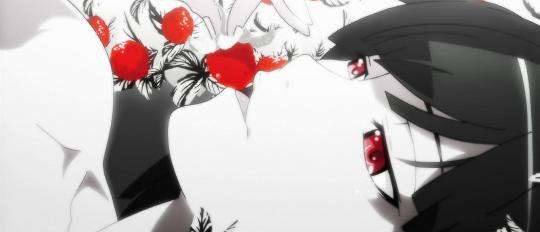
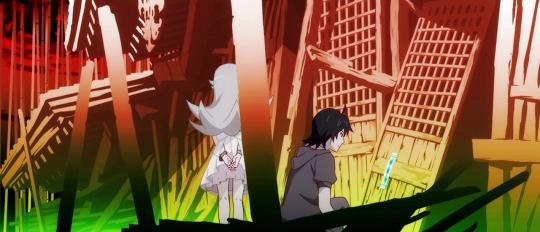
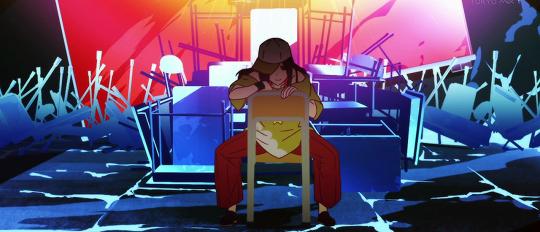
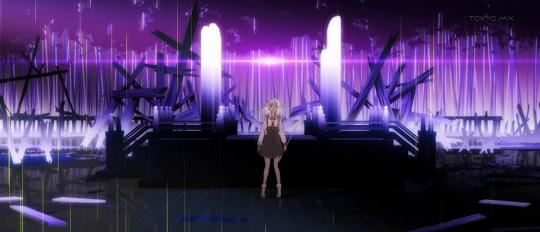
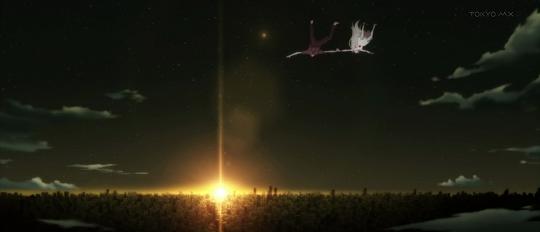
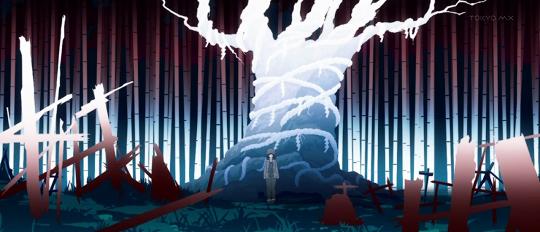
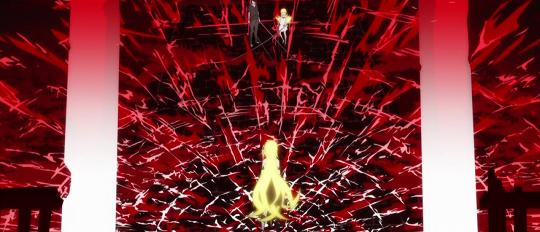
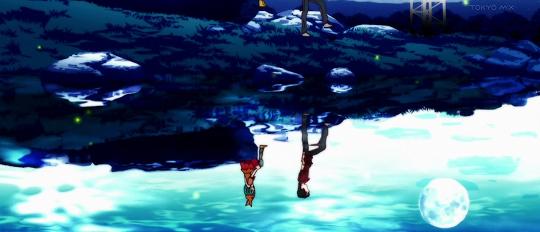

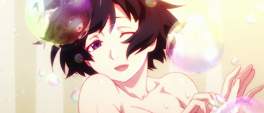
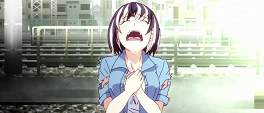
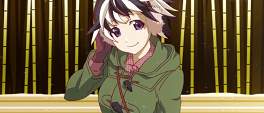
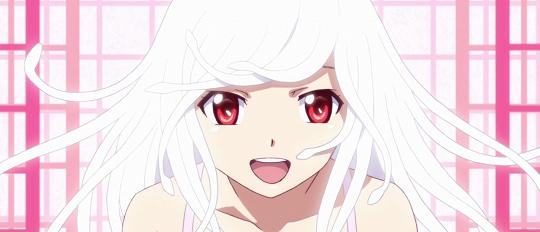
That aside, the storyline itself was very strong and certainly stands up well next to the previous seasons. Hachikuji's conclusion was genuinely moving, and Nadeko as a character comes across as thoroughly unlikable, and rightly so.
In the increasingly rare moments of 'animation' the character interplay was what kept me coming back...and when you have the likes of Maaya Sakamoto and Yui Horie on board, that's enough to carry it.
So many of the situations and relationship were shaken up that I honestly look forward to where it goes in the future (because I'd be very surprised if the franchise stopped here).
Anyway. Great article. Makes me wish I'd written about this series after all. :)